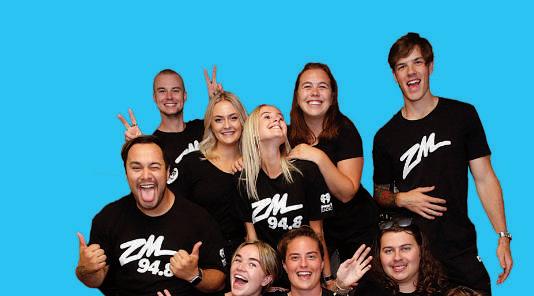
9 minute read
What are your options?
By now, you’ve probably got a good idea of the type of courses you should apply for. Your choice of subject area will influence the choice of institution at which you want to enrol. For example, if you want to be a doctor, you will need to enrol at one of the university medical schools (The University of Auckland or University of Otago).
If you want to be an IT professional, you havea huge range of options, from computer science degrees at university, polytechnic level diplomas or certificates, or qualifications from specialised IT private training establishments. Each institute has a different spin on thebroader topic (some are hands-on, some are more theoretical), so do your research and compare thecourses before you apply.
Advertisement
It’sa bit more challenging if you have no idea what you want to study, right? My Voice has some suggestions to help you narrow your search: What areyour hobbies? This is how a lot of people decide what they want to study after secondary school. You might think you want to be a scientist, but if you’ve always been good at art and love drawing pictures of buildings and funky designs, then maybe you should consider studying as an architect or draughtsperson. For some, the passion is even more personal. If you’ve lost a family member to cancer, you might be motivated to become a cancer researcher. Bear in mind that you’re more likely to enjoy studying a subject you already love rather than the subject you think – or your parents or whānau think – you should do.

What subjects have youmost enjoyed at school? This isa no-brainer. If you area maths guru,why not consider studying tobe a mathematician or statistician? Is English awesome?Consideranarts degree. Enjoy history, te reo Māori, or cultural studies? Continue your study in the social sciences or anthropology at uni. Sometimes it doesn’t need to bea school subject. Do you love hanging with your friends and defusing their dramas? What about studying youth work or social work? What is your personality type? The Myers– Briggs personality test will guide you to study areas thatare in harmony with your personality type. Just remember, your selected personality type is not set in stone– it reflects your thoughts and feelings right now. That could change subtly in the future… but for now, it’sa handy, quick tool to draw your attention to relevant subject areas.
Use government resources Foremost among these is theCareers New Zealand courses database www. careers.govt.nz/education-and-training. If you’rea lazy Googler, this website is a good place to start. You’ll find general information on hundreds of different study areas. Our advice: once you’ve decided what subject areas interest you, look on the individual institutions’ websites to getspecifics about those courses.Aswith any third party website, the information is not guaranteed to reflect the latest changes. Go straight to the source for that.
Will my course lead toa job? Another consideration to study is your jobprospects. Sure,a psychology or visual arts degree might sound awesome, but the job prospects after graduating might not beas high as otherfields.
Northland’s only specialist training provider Evolution School of Beauty, Massage, Spa & Nails
F i nd ou t m ore a b o ut ou r co u r se s :
• NZ Ce r t i f i c at e i n B e a u t y T he r ap y • NZ Di p l o ma in Be a u ty Th e r a p y • NZ Ce r t i f i c at e i n N a i l Tec h n o l og y • NZ Ce r t i f i c at e i n S p a T h e r ap y • NZ Di p l o ma in We ll n e s s & Re l ax a t i o n M as s a g e
FEES FREE foreligible students

All programmes are NZQA approved - Student loans & allowances available 115 Cameron St, Whangarei 09 438 6583
info@evolutionschool.co.nz www.evolutionschool.co.nz

Continued ...
If you come away froma tertiary institution witha qualification in an area that desperately needs workers, then findinga job will be relatively pain-free. This is something you should look into prior to enrolling. It also pays to think about what parts of the country employ the most people in different sectors; for example, Christchurch might have a higher demand for builders during the rebuild, than, say, Dunedin. Be aware that you may have to move to where the work is to land your first graduate job. To make yourself attractive to potential employers, ensure you work hard while studying in order to make your academic transcript something to be proud of, and something that gets you noticed.
When deciding ona qualification, you should look at how well recognised it is in the workforce; ask your teachers, parents, parents’ friends, whānau, and careers counsellors which institutions and courses are well regarded in the area in which you want to study.
Geta job Decided that tertiary study isn’t for you? At least not right now? No sweat, there are still plenty of options. You can use your time to figure out if study might be an option further down the track. This is something all students should consider if they are unsure what they want to be doing.
If you’ve been workinga weekend or part-time job while at college, ask if they can bump your hours up once exams have finished. This doesn’t have to be a permanent move, but it helps to keep earning money while looking fora job that’s more suited to the career path you want. But what if you have no idea what you want to do? Don’t stress. You are at the beginning of the path to your future – not many people are certain of what they want to do at this point. Many people change their minds repeatedly before they settle on a career path: it takes time.
Sometimes, to get an idea of your future, it helps to look back. The same advice for study options applies to career options. What made you feel happiest or what do you feel came to you most naturally? Did you love geography? Biology? Art? Think of your favourite school subjects, your hobbies, even the sports you play (yes, beinga professional athlete is a legitimate career choice– you just need amazing talent, perseverance, anda bit of luck… although it’s a dream many may never achieve).
From there, look into what companies have these jobs, and research them online.
It might pay to contacta place that looks interesting to see if you can come in to havea look around for the day, or set upa time to meet with someone who works there to talk about what is required in their role. Refer to our sector profiles to get an idea of some different jobs and sectors.
The gap year You don’t need to dive straight into a decision once you leave school. The time-honoured big OE (overseas experience) can show you the world in a way you only imagined in school. Take your pick where you go– the world is your oyster, and pearls of adventure lie in Europe, Africa, Asia, and the Americas. However, every country has different visa requirements, and for almost every country you will needa visa to enter. Research these on your chosen country’s government website.
The glory of the gap year is that you can geta working holiday visa in some countries, which allows you freedom to earn while you experience life abroad. Great first-up jobs for gap year Kiwis include working as an au pair (nanny), summer camp work in the US, or as a snowboard instructor in Canada or Europe. Casual work in hospitality (pubs, cafes, and restaurants) is a staple gap year income.
The reason it’s calleda gap year is because when you return to New Zealand, you then face the same choice: study or full-time work. Many successfully get intoa course, defer their enrolment fora year, and then go off for their big OE for 12 months.
Unpaid work If you’ve kept a part-time job following secondary school, then you could try and set up some work experience or an internship at a company that you’re interested in. This is a common practice in fashion and some media companies.
With many businesses under financial pressure, jobs aren’t exactly being handed out at the door, but if you’re interning ata place on an ongoing basis, then you could be considered fora paid position when one becomes available.
Potential employers may also appreciate someone who is willing to help out for nothing, and it’sa great experience you can add to your CV.
If interested in the not-for-profit sector, you could also use the time to get into some volunteer work. Volunteering makes up a surprisingly huge sector in New Zealand, and help is always needed. You can find out how organisations handle getting the job done on a shoestring budget, and feel proud that you’re helping parts of society that desperately need it.
Sometimes, to getanidea of your future, it helps to look back.The same advice for study options applies to career options.What made you feelhappiestorwhat do you feel came to you most naturally? Did you love geography? Biology? Art? Think of your favourite school subjects, your hobbies, even the sports you play.
COME WORK FOR US!
We’re on the hunt for the next generationofZM Black Thunders! If you’re in year 12 or 13 and are keen to get some experience in the media industry all while earning some money too, then this is the perfect job for you! We’re looking for fun, outgoing and reliable students to come on board, if this sounds like a bit of you, then send us your CV and a bit about yourself. ZMNorthland@nzme co nzland@nzme.co.nz







94.8FM










